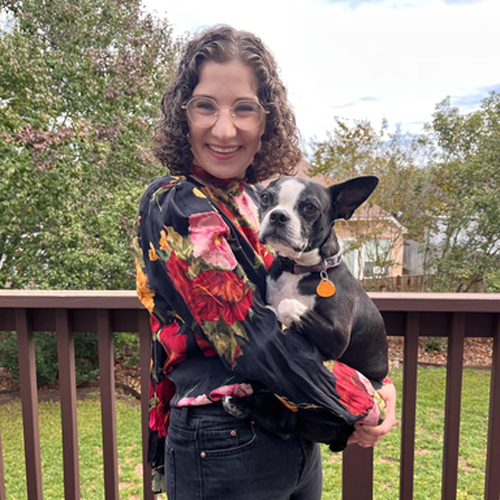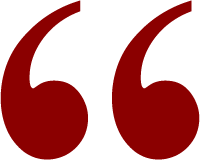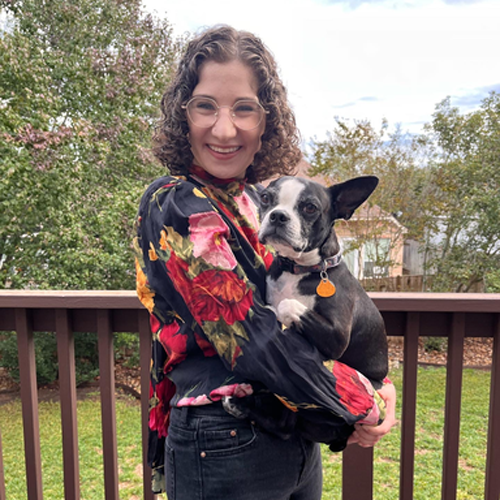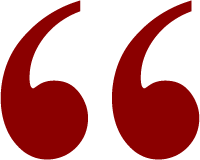Spotlight Sabrina Epstein

Spotlight Sabrina Epstein



Sabrina Epstein


How long have you worked for DRC?
8 months.
What do you do in your current role?
As a policy analyst, I get to work on work with all the attorneys in the Intellectual and Developmental Disability (I/DD) practice group to bring a policy lens to our work.
Some of the issues that I have been working on this year include racial and ethnic disparities in services for people with developmental disabilities. So, looking at how we can get services to people more equitably. Also looking at who has been left out from the move to de-institutionalization and supporting people in their homes and in the community.
I have always wanted to work in disability related work. I have a degree in public health, so after college I started working on Medicaid issues and home and community-based services.
I found that I really like the overlap of getting to work on public health and policy and the ways that our health system and Medicaid can support people in the community.
It’s really cool to get to work on these issues at a state level, because so much of the policy to support people living in their own homes in the community happens at a state level.
Do you have any personal connection to the disability community?
I have a disability and I really bring that perspective to all of my work. I think it helps me relate to the folks that we work with. I really love getting to work with other disabled people at DRC, we have so many people with different disability experiences who get to bring that to the table.
So many of our colleagues are really generous with sharing their personal experiences with others, and it's really great to have that in a workplace, and for folks to feel comfortable disclosing their disabilities. That’s certainly not true of every workplace.
What is the most recent show/movie/book you've watched or read?
I have been reading a lot of speculative fiction. I love novels, I read a lot of books. Some of my favorite authors are Octavia Butler, N.K. Jemisin, and Becky Chambers.
What is something unique about DRC that you haven’t experienced at a previous job?
It’s really great to work somewhere where everyone has a baseline understanding of disability in some way.
It opens up so many more nuanced discussions and so many more diverse perspectives within the disability space when everyone is already like, ‘we're already going to be talking about disability, where do we go from there?’ Instead of just whether disability is even going to be on the table.
I really value that about DRC, and I think it means that we get to really push the envelope sometimes about what disability is, what the disability community means, and continue to have those important conversations.
What is something unique about you (a fun fact) that few people are aware of?
I love art, it has always been a really big part of my life. I have always done art; especially visual painting and I love going to art museums and galleries. In college I minored in visual arts and museum studies.
I mostly do acrylic painting, but I also like watercolor a lot, and I like fiber art — so anything to do with fabric, or knitting, and crocheting.
Art and disability have been really connected for me too, and I also spent the summer at the National Endowment for the Arts doing arts accessibility work there. There's so many cool disabled artists out there, and I just love getting to see their art and the ways people bring their disability to their artwork.
If you could tell your 13-year-old self one thing, what would it be?
I would want to give my 13-year-old self a hug and tell her that some of the most frustrating things about her life are things that she’ll find community around later in life.
What is an accomplishment that shaped or impacted your career?
In 2021, I worked on the vaccine dashboard at Johns Hopkins Disability Health Research Center, where we were tracking how the COVID vaccine was being prioritized in every state by different disability categories.
And that's one of my favorite projects I've ever worked on because it really got to help people on an individual level and the systemic level. Since we were publishing this information every week, people got to find out whether they qualified for the COVID vaccine during its early rollout in their state.
It was really cool because all of us working on the project really got to bring our disability experience for it. The project never would have happened if it hadn't come from disabled people's own experiences.
Do you have a word, phrase, motto, or poem that you like? If so, what is it?
There’s a poem by a disabled woman Laura Hershey called ‘You Get Proud By Practicing.’ It was a favorite poem by an activist who was a mentor of mine who died a few years ago, and the poem reminds me of her and all of the work that we did together. It makes me smile whenever I read it, and it really reminds me of a wonderful mentor.
Excerpt from "You Get Proud By Practicing"
You do not need
to be able to walk, or see, or hear,
or use big, complicated words,
or do any of the things that you just can’t do
to be proud. A caseworker
cannot make you proud,
or a doctor.
You only need
more practice.
You get proud
by practicing.
— Laura Hershey
Read Full Poem
How would your friends and family describe you?
As creative and determined.
How do you like to spend your time when you aren’t working?
I spend a lot of time with my Boston terrier, Nandor the Relentless (named for the TV series ‘What We Do in the Shadows’).
I love to go to the farmer’s market and find fun things to cook. I love to bake different gluten free things—I made this cake recently for my birthday that was a vanilla cake with lemon, homemade lemon curd filling, and a honey Swiss meringue buttercream.
join the drc team!




